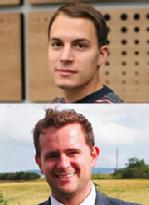Student Roles During The Pandemic


Student Spotlight
Medical Student Clinical Support Worker:
Imtiaz Chowdhury
 Experience: This was my first time working in this capacity, my previous experience wasn't in such a hands-on caring role.
Experience: This was my first time working in this capacity, my previous experience wasn't in such a hands-on caring role.
Ward: COVID/Care of the Elderly
What you did: Mainly it was HCA work: feeding, washing, toileting, and changing beds. I kept the patients company, made them plenty of teas and coffees, took their observations regularly, liaised with relatives, and sometimes inserted cannulas or took blood samples.
Why did you get involved? I wanted to help out in an unprecedented time, and it was great to be doing something useful rather than sitting at home. As a student, the money was helpful too.
SJA Emergency Ambulance Crew: Liz Lennox

Experience: I joined St John's Ambulance as a First Aider in 2014, and have been volunteering at events ever since. I upskilled to Advanced First Aider just before I started at WMS in 2017, and then completed my ambulance qualification during my second year of medical school.
Unit: East Midlands Ambulance Service
What you did: As an ambulance crew member, I assisted the statutory crews by responding to a mixture of 999 and patient transfer calls. We attended everything from serious heart attacks to hospital discharges to keep patients moving.
Why did you get involved? I’ve been volunteering with St John Ambulance for a long time, and I wanted to put my skills to use at a time when the NHS needed them most.
Patient Connect: Jean-Pierre and Tom

Project: Patient Connect
What you did: We started a collaborative project to bring hospital patients together with their loved ones during this time of isolation. We provide technology and support to facilitate internet-enabled video and voice calls between patients and their relatives.
Why did you get involved?
Through our experience in hospital, we noticed how limited the telephone signal can be, and that many patients don't have suitable technology to contact their families. Older adults are more likely to be affected by COVID-19, and are more likely to have prolonged hospital stays, increasing their vulnerability and risk of loneliness.
We could see a solution to help these patients, so we had to act. The project has been a massive success; our tablets connect loved ones together at the beginning and end of life, helping to restore dignity and improve their care.
Find out more about the project.
111 Operator: Pip Hammond

Experience: I've been working for NHS 111 since I graduated with my Psychology Degree in 2013. It seemed like a great way to get into the NHS and gain some experience, and I had a background in phone customer service.
Unit: NHS 111 Call Centre
What you did: The role involves phone triage of patient symptoms, before directing them to the most suitable service (whether that's A&E, a GP, a Pharmacy, or the Out Of Hours Service). I am the first person a patient speaks to, so calls can vary from an earache to a cardiac arrest with me directing CPR over the phone.
Medicine has really helped me with targeting my questions and picking up on any red flags.
Why did you get involved? I've always carried on with the role throughout Medical School, so it made sense to pick up some extra shifts and help during the pandemic. NHS 111 is a great way to stop certain areas of the hospital from getting overloaded and ensuring COVID-positive patients don't go into hospital unnecessarily- it may get some bad press but I think it's a very important service.
